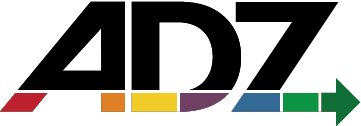Team of teams Roles
- Values & Goals
- Understand my team's role
- Accountability to my team
- Self governing team
- Self organizing team
- Purpose
- Agile mindset
- Willing to learn & grow
- Product & Impact
- Prioritized healthy backlog
- Working software with quality
- Necessary tools to do the job
- Good metric tracking (KPIs)
- ToT working agreement
- Predictable delivery
- Product feedback loops
- Marketing plans
- Training courses
- Leadership & Culture
- ToT morale
- Cross-Team camaraderie
- Shared vision/goals
- ToT values
- Understand function of other teams
- External perception
- Trust, transparency
- Cross-Team feedback
- Servant leadership culture
- Conscious Leadership culture
- Continuous improvement culture
- Cross-Team collaboration
- Team member rotation
- Development of future leaders
- Markets & Environment
- Effective Agile process
- Effective architecture
- Collaboration space
- Collaboration tools
- Predictable cadence
- Automation where appropriate
- Effective Business processes
- Sales pipeline
- Sufficient funding & sponsorship
- Upstream dependencies support success
- Specialized services support
- Share best practices
- Cross training
The Team of Teams is the first holon of Scaled Agile. Its success depends on the health of the Teams that comprise it, and the strength of the relationships between them. Teams conduct their own ceremonies and participate in the ceremonies of the Team of Teams holon, along with their peers. With proper communication, representation and information sharing Teams of Teams are able to rapidly create value in a much broader scale with minimal loss due to overhead. Without it, key risks due to handoffs, waiting for dependencies, rework due to integration of incompatible designs, siloed knowledge and missed opportunities for reuse, co-design and learning can substantially diminish the capacity of the Team of Teams.
Team of Teams Coach
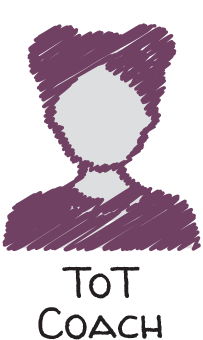 The Team of Teams Agile coach is the main Agile champion for all the teams and their supporting partners involved with any given product or technology area who are collaborating together. They adapt organizational Agile standards to suit their particular environment but maintain compatibility with the portfolio as a whole. They are mentors to the Scrum Masters on each team and work through them, providing training, support, and feedback to help ensure both their and the team’s success. They facilitate the ToT Agile sessions and meet regularly with everyone on the Product Team to help them understand how they need to adapt their understanding of their role to be most effective in the new Agile way of working.
The Team of Teams Agile coach is the main Agile champion for all the teams and their supporting partners involved with any given product or technology area who are collaborating together. They adapt organizational Agile standards to suit their particular environment but maintain compatibility with the portfolio as a whole. They are mentors to the Scrum Masters on each team and work through them, providing training, support, and feedback to help ensure both their and the team’s success. They facilitate the ToT Agile sessions and meet regularly with everyone on the Product Team to help them understand how they need to adapt their understanding of their role to be most effective in the new Agile way of working.
- Values & Goals
- Servant Leader Mindset
- Coach, Enabler
- Agile expertise
- Adaptable & flexible
- Systems thinking
- Proactive problem solver
- Product & Impact
- Empirical Observation of progress & improvement
- Configures the Agile tool
- Promotes achievement mindset
- Leads by example
- Train team members
- Leadership & Culture
- Creates trust relationships
- Help stay aligned to values
- Visibility & Transparency
- Motivates & inspires
- Helps team members commit
- Collaborates to improve process
- Mentors SMs
- Markets & Environment
- Adapts the process/methodology
- Broad view towards increasing Agility
- Facilitates meetings
- Improves flow
- Creates an environment of success
Chief Product Owner
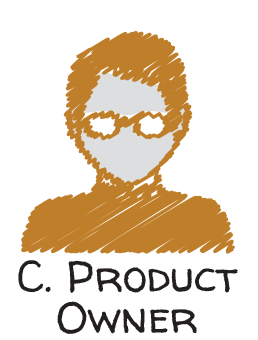 The Chief Product Owner has a dual leadership role, leading their team of Product Owners who support the various times while at the same time leading the charge for the Product Team as a whole to rally behind their Product Vision. The leaders and SMEs on the Product Team can then carry that vision to the various folks with whom they interact, helping to get everyone pulling in the same direction. The CPO defines the value proposition and prioritizes the features they believe will have the greatest impact on the customer and the market.
The Chief Product Owner has a dual leadership role, leading their team of Product Owners who support the various times while at the same time leading the charge for the Product Team as a whole to rally behind their Product Vision. The leaders and SMEs on the Product Team can then carry that vision to the various folks with whom they interact, helping to get everyone pulling in the same direction. The CPO defines the value proposition and prioritizes the features they believe will have the greatest impact on the customer and the market.
- Values & Goals
- Passionate about the product
- Result oriented
- Clearly communicates value
- Deep understanding of market & customer
- Owns the Vision
- Inspirational leader
- Product & Impact
- Creates Feature Backlog
- Defines priority
- Owns Feature/Epics readiness
- Creation of value
- Leadership & Culture
- Accepts completed Features
- Creates Objectives (OKRs)
- Shares the Vision
- Communicates with Stakeholders
- Shares overall value with team
- Ensures alignment & communication with teams and leadership
- Markets & Environment
- Product impact on system/product family
- Market impact
- Allows freedom inside of priority context
Architect
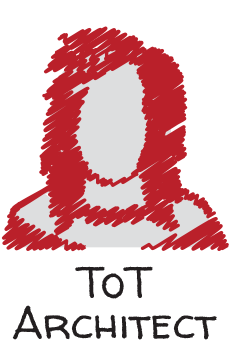 The Team of Teams Architect is accountable for the integrity of the technical platform(s) that support the solutions that the teams are building. This includes alignment with architectural standards and vision as well as the capabilities needed to support the current and future functional and non-functional requirements of the solutions.
The Team of Teams Architect is accountable for the integrity of the technical platform(s) that support the solutions that the teams are building. This includes alignment with architectural standards and vision as well as the capabilities needed to support the current and future functional and non-functional requirements of the solutions.
The Architect is responsible for ensuring each Team Technical Lead is able to support the teams in producing code with consistent quality and style, take advantage of opportunities for reuse and integration, and share knowledge with other teams about the structure of the overall solution.
The ToT Architect may also be responsible for promoting and supporting the use of continuous integration, delivery, automated testing and deployment solutions across the Teams.
- Values & Goals
- Results Oriented
- Rapid decision making
- Collaborative
- Market & customer context
- Inspirational Leader
- Creative, visionary motivator
- Challenges status Quo
- Entrepreneurial mindset
- Systemic design thinker
- Flexible
- Root cause focused
- Product & Impact
- Defines systems
- Owns Performance & Standards
- Creates work items with their team
- Prioritize towards strategic deadlines
- Ensure quality
- Owns architectural runway
- Owns system KPIs
- Solves problems/outages
- Leadership & Culture
- Mentors
- Train/teach the team
- Provides clarity/confidence/guidance
- Provides feedback
- Collaborates with other SMEs
- Articulates future state
- Ensures alignment & communication with teams and leadership
- Markets & Environment
- Identifies Market Needs
- Allows freedom within guard rails
- Focus on competitive advantage
- Helps eliminate waste endemic to flow of work
- Talent consultant
- Autonomy to define uplift strategy
- Manage tech debt
- Automation
- Integration of subsidiary systems
- Responsible for compliance/regulatory
Stakeholder/Business Owner
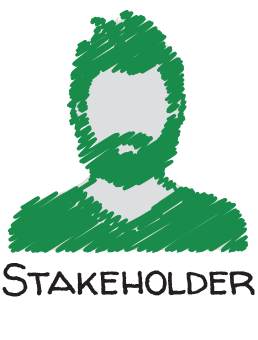 The Stakeholders at the Team of Teams Holon play a similar role to the Team Holon - mostly to help set objectives and give feedback to help create a better product. Many stakeholders working in a traditional environment may be accustomed to being relatively disengaged, sometimes only seeing a product after it’s done. Understanding precisely when and how to engage stakeholders, and helping them understand that they play an important role throughout the process is critical to achieving the results possible with a healthy Agile process.
The Stakeholders at the Team of Teams Holon play a similar role to the Team Holon - mostly to help set objectives and give feedback to help create a better product. Many stakeholders working in a traditional environment may be accustomed to being relatively disengaged, sometimes only seeing a product after it’s done. Understanding precisely when and how to engage stakeholders, and helping them understand that they play an important role throughout the process is critical to achieving the results possible with a healthy Agile process.
- Values & Goals
- Engaged in the Agile process
- Customer focused
- Clear of purpose & direction
- Value/Impact mindset
- Product & Impact
- Helps define OKRs
- Rapid decision making
- Attends Demos
- Attends Continuous Improvement events
- Leadership & Culture
- Partners with the CPO
- Gives teams directional feedback
- Trusts the teams
- Markets & Environment
- Uses long feedback loops to course correct
- Stays ahead of the market
- Aligns with broader organizational objectives
Subject Matter Expert
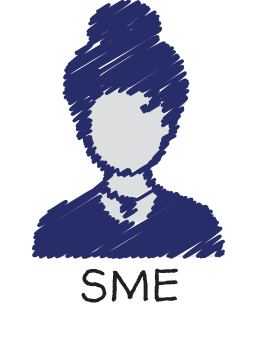 Subject Matter Experts at the Team of Teams holon tend to be dedicated to the product/technology areas they are supporting. They are the go to experts the teams rely on to make sure their work is in line with the standards/markets/technologies where these people have deep experience. An example might be entering international markets where there’s an SME for each market that helps the Product Team prioritize features based on what would be popular in Japan versus what the Italian market would demand. They should be involved in all areas of the delivery process from ideation to delivery as appropriate.
Subject Matter Experts at the Team of Teams holon tend to be dedicated to the product/technology areas they are supporting. They are the go to experts the teams rely on to make sure their work is in line with the standards/markets/technologies where these people have deep experience. An example might be entering international markets where there’s an SME for each market that helps the Product Team prioritize features based on what would be popular in Japan versus what the Italian market would demand. They should be involved in all areas of the delivery process from ideation to delivery as appropriate.
- Values & Goals
- Understand how they contribute to the purpose
- Demonstrates commitment & responsibility
- Proactively acts & communicates
- Willing to learn & grow
- Self manager
- Product & Impact
- Contributes to the solution
- Creates artifacts & guidelines
- Helps prioritize
- Reviews product quality
- Leadership & Culture
- Aligns to the vision
- Shares knowledge with context
- Collaborates with teams
- Provides support
- Markets & Environment
- Awareness of the market
- Awareness of systems
- Prioritizes their capacity
- Organizational navigation
- Reviews precedent/standards
Product Team
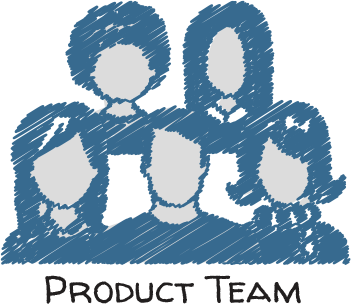 The Product team is composed of the Chief Product Owner, their team of Product Owners, and all of the Architects, Subject Matter Experts, and Stakeholders necessary to envision, elaborate, and prioritize features of the products they are building/supporting. They work together to create the Objectives and Key Results (OKRs) that will drive the product strategy going forward. This team largely is responsible for prioritizing and defining product features, rapid prototyping and other discovery type work, and creating the technical implementation solution. They work with other Product Teams to ensure alignment around goals and a consistent customer experience across products in the same product family.
The Product team is composed of the Chief Product Owner, their team of Product Owners, and all of the Architects, Subject Matter Experts, and Stakeholders necessary to envision, elaborate, and prioritize features of the products they are building/supporting. They work together to create the Objectives and Key Results (OKRs) that will drive the product strategy going forward. This team largely is responsible for prioritizing and defining product features, rapid prototyping and other discovery type work, and creating the technical implementation solution. They work with other Product Teams to ensure alignment around goals and a consistent customer experience across products in the same product family.
- Values & Goals
- Committed to the product vision
- Demonstrates commitment & responsibility
- Proactively acts & communicates
- Willing to learn & grow
- Challenges the status quo if appropriate
- Customer focused
- Conscious Leader
- Leads by example & mentorship
- Systems thinking
- Product & Impact
- Enables customer value
- Helps define features
- Responds to ToT metrics
- Defines reusable functionality
- Design & discovery prototyping
- Contributes to OKRs & prioritization
- Contributes to roadmaps
- Leadership & Culture
- Shares responsibility towards ToT goal
- Promotes healthy Culture
- Transparent, overcommunication
- Shares best practices
- Innovation & Growth culture
- Business & tech partnership
- Creates a feeling of safety
- Supports emerging needs
- Empowers and enables
- Dependency coordination
- Markets & Environment
- Follows/Trusts the processes & standards
- Ability to network with outside systems
- Ruthlessly eliminates waste
- Balances internal & external needs
- Automation focus
- Improves ToT standards
- Enables optimal flow
- Evolves roles & responsibilities
- Follows market trends
- Systemic innovation



